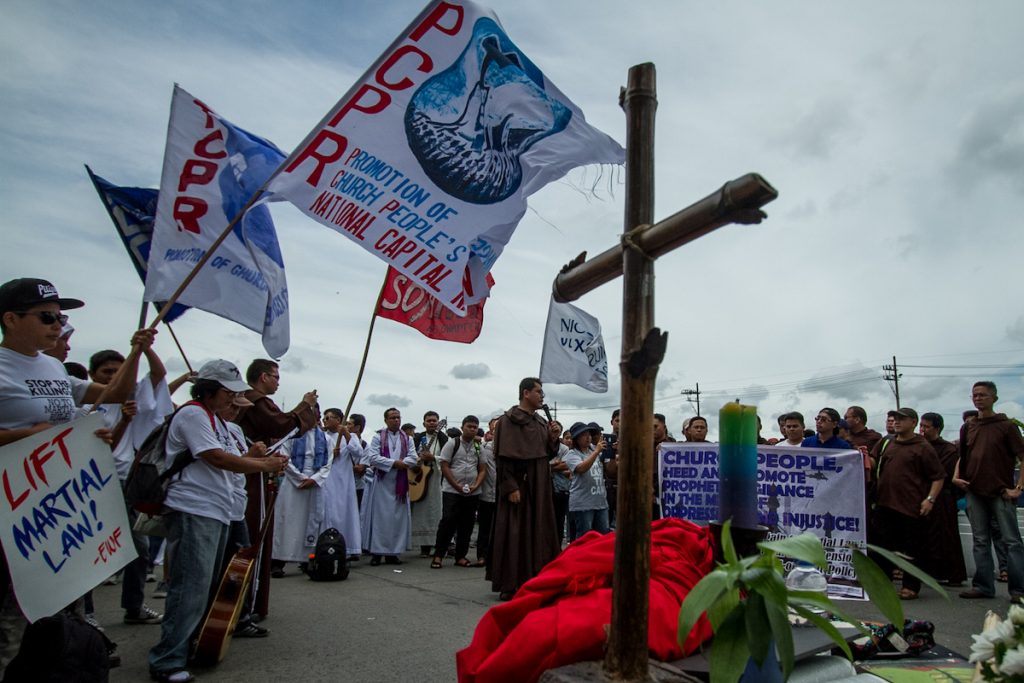A civil forfeiture case has been filed against the Rural Missionaries of the Philippines (RMP) over allegations of “financing terrorist activities.”
On Sept. 23, the religious group learned that a civil forfeiture case has been filed at the Manila Regional Trial Court against 15 of its bank accounts.
Faith-based organizations decried alleged state-sanctioned attacks on a religious institution that is engaged in various ministries with the poor.
RMP is a religious organization, which is inter-congregational and inter-diocesan in character, of religious women and men, priests, and lay people that was founded on Aug. 15, 1969.
It is a “mission partner” of the Association of Major Religious Superiors in the Philippines.
The faith-based group is currently under scrutiny of the Philippine government for alleged terrorism financing and for allegedly being an above-ground communist organization.
In February this year, the government’s Anti-Money Laundering Council ordered a 20-day freeze on the group’s accounts with the Bank of the Philippine Islands (BPI).
The council claimed that there is “probable cause that the BPI accounts of RMP are related to terrorism financing.”
It also asked the government’s solicitor general to ask the court of appeals to extend the freeze order against the RMP accounts for up to six months.
The Promotion of Church People’s Response (PCPR) condemned the move against the organization that has been “at the forefront in pioneering humanitarian response and delivery of services.”
Father Rolly de Leon, co-chairperson of PCPR, said RMP “now face attacks precisely because they have been exposing state human rights violations in rural communities.”
The priest accused the administration of President Rodrigo Duterte of “restricting humanitarian aid and development ministries” in rural areas as part of the government’s anti-insurgency campaign.
“These latest efforts to freeze the accounts of RMP lay bare a sinister intention to undermine its avowed ministries with the poor,” said Father De Leon.
“Democratic space and civil liberties have become more and more restricted, with pronouncements and machinations that seek to cast aspersions on church people delivering much-needed services in poor communities,” he added.
Last year, the government filed charges against three RMP leaders.

A perjury case was filed against 80-year-old Good Shepherd nun Elena Belardo while arson, kidnapping, and robbery charges were filed against 63-year-old Sister Emma Teresita Cupin of the Missionary Sisters of Mary congregation.
A “frustrated murder” charge was filed against 74-year-old lay worker Angie Ipong.
On Feb. 7, RMP lay worker Marielle Domequil was arrested and detained after a series of dawn raids at the offices of RMP and other people’s organizations in Tacloban City.
In 2018, Duterte personally ordered the deportation of Australian nun Patricia Fox, who headed RMP for several years and had been serving farmers and farmworkers in the Philippines for 27 years.
Father Dionito Cabillas of the group Isaiah Ministry said the attacks on RMP are “attacks on religious freedom” and “attacks on the poor.”
“By freezing the RMP accounts and now the forfeiture case, the government is depriving the masses of the services that the church group has been extending to the poor,” said Father Cabillas of the Philippine Independent Church.
The priest challenged the government to “present solid evidence” to prove its claims against the faith-based group.
In a statement, RMP urged the court “to deny the petition for Asset Preservation Order” and “to dismiss the baseless civil forfeiture case.”
RMP said it already denied any involvement in any form of financing terrorism and has “always insisted that the said bank accounts were created and maintained for completed and ongoing projects of the organization, as well as for its internal operations.”
Sister Elsa Compuesto, RMP national coordinator, said donations and funding received by the organization “were used to implement projects and programs for rural poor communities all over the country.”
RMP has pioneered literacy and numeracy programs in various farming and tribal communities across the country.
Also, RMP has relief and rehabilitation programs for disaster-stricken communities, and human rights campaigns and advocacy projects.
“These programs have helped many tribal communities in establishing alternative schools, and in promoting the advocacy for the right to ancestral lands and self-determination,” said Sister Compuesto.
She said the allegations against the organization “is clearly meant to impede us in our advocacy for land, justice and peace; to deny the rural poor of the services they deserve; and ultimately, to hinder us from bringing to light the continued red-tagging, harassment, and threats against human rights defenders and peace advocates.”